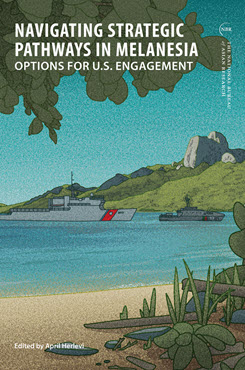Essay in NBR Special Report 110
Melanesian Responses to Strategic Competition in the Pacific
This essay examines the approaches of Melanesian states to navigating the power dynamics of U.S.-China strategic competition and considers policy options to improve cooperation both within the region and with external development partners.
EXECUTIVE SUMMARY
MAIN ARGUMENT
The institutional capacity and domestic agendas of Melanesian states are critical determinants in how they manage the spillover effects of U.S.-China strategic competition in the region. Although great-power rivalry presents significant challenges for these states, given their institutional weaknesses and a political culture that is not oriented toward foreign policy, their engagement with external development partners affords an opportunity to build institutional resilience and an informed citizenry. The negative effects of geostrategic competition can be mitigated if creative ways of conducting diplomacy and engaging with external actors are envisaged and implemented. Melanesian states have a responsibility to their citizens to prevent further tensions and misunderstandings. This could mean using a regional public diplomacy strategy to communicate characteristically Melanesian worldviews to external parties. Because foreign relations may not be a funding priority for Melanesian governments, the Melanesian Spearhead Group remains a useful coordinating organization for more elaborate initiatives, such as implementing a common Melanesian public diplomacy strategy.
POLICY IMPLICATIONS
- While Melanesian states are protective of their sovereignty and claim to pursue foreign relations as the basis to advance their national interests, collectively working through regional organizations such as the Melanesian Spearhead Group could facilitate a unified approach to managing the negative effects of great-power rivalry.
- For a “friends to all, enemies to none” foreign policy orientation that emphasizes nonalignment to be effective, Melanesian states must develop a public diplomacy strategy to communicate their foreign policy goals to the U.S. and China.
- At present, a deficit in democratic practices in Melanesian states plagues the domestic coordination and legitimacy of foreign policy decision-making. This translates into very unpopular foreign policy decisions that in all likelihood compromise these countries’ sovereignty and will be destabilizing to the internal politics of Melanesian states.
Patrick Kaiku is a Teaching Fellow in the Political Science Strand at the University of Papua New Guinea and an East-West Center alumnus.
Vernon Gawi is an Intern in the Office of the Governor of the National Capital District in Papua New Guinea. He is also a U.S. Academic Exchange alumnus and is currently the Global UGRAD Secretary of his 2023 cohort in PNG.


